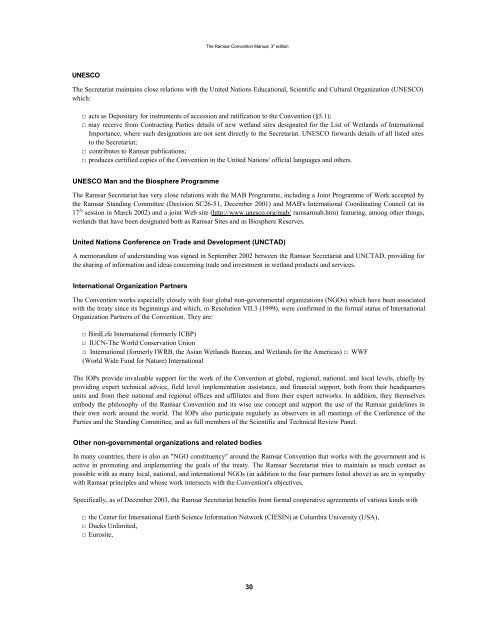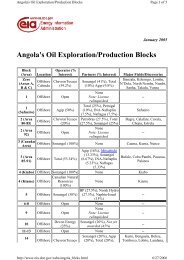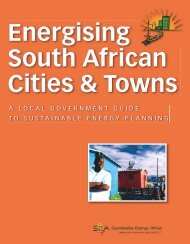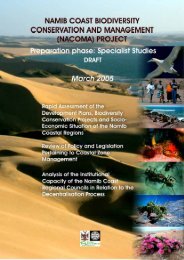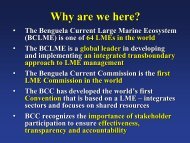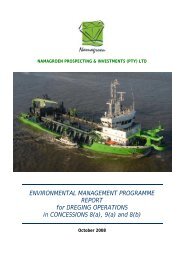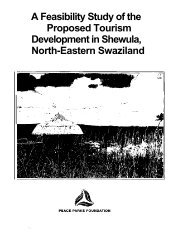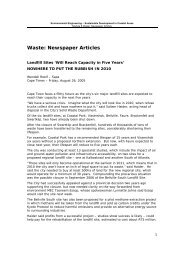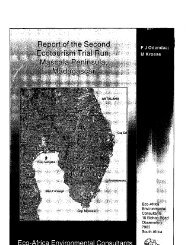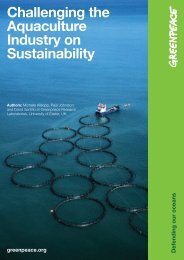The Ramsar Convention Manual.pdf
The Ramsar Convention Manual.pdf
The Ramsar Convention Manual.pdf
You also want an ePaper? Increase the reach of your titles
YUMPU automatically turns print PDFs into web optimized ePapers that Google loves.
<strong>The</strong> <strong>Ramsar</strong> <strong>Convention</strong> <strong>Manual</strong>, 3" edition<br />
UNESCO<br />
<strong>The</strong> Secretariat maintains close relations with the United Nations Educational, Scientific and Cultural Organization (UNESCO)<br />
which:<br />
□ acts as Depositary for instruments of accession and ratification to the <strong>Convention</strong> (§5.1);<br />
□ may receive from Contracting Parties details of new wetland sites designated for the List of Wetlands of International<br />
Importance, where such designations are not sent directly to the Secretariat. UNESCO forwards details of all listed sites<br />
to the Secretariat;<br />
□ contributes to <strong>Ramsar</strong> publications;<br />
□ produces certified copies of the <strong>Convention</strong> in the United Nations' official languages and others.<br />
UNESCO Man and the Biosphere Programme<br />
<strong>The</strong> <strong>Ramsar</strong> Secretariat has very close relations with the MAB Programme, including a Joint Programme of Work accepted by<br />
the <strong>Ramsar</strong> Standing Committee (Decision SC26-51, December 2001) and MAB's International Coordinating Council (at its<br />
17 ,h session in March 2002) and a joint Web site (http://www.unesco.org/mab/ ramsarmab.htm) featuring, among other things,<br />
wetlands that have been designated both as <strong>Ramsar</strong> Sites and as Biosphere Reserves.<br />
United Nations Conference on Trade and Development (UNCTAD)<br />
A memorandum of understanding was signed in September 2002 between the <strong>Ramsar</strong> Secretariat and UNCTAD, providing for<br />
the sharing of information and ideas concerning trade and investment in wetland products and services.<br />
International Organization Partners<br />
<strong>The</strong> <strong>Convention</strong> works especially closely with four global non-governmental organizations (NGOs) which have been associated<br />
with the treaty since its beginnings and which, in Resolution VII.3 (1999), were confirmed in the formal status of International<br />
Organization Partners of the <strong>Convention</strong>. <strong>The</strong>y are:<br />
□ BirdLife International (formerly ICBP)<br />
□ IUCN-<strong>The</strong> World Conservation Union<br />
□ International (formerly IWRB, the Asian Wetlands Bureau, and Wetlands for the Americas) □ WWF<br />
(World Wide Fund for Nature) International<br />
<strong>The</strong> IOPs provide invaluable support for the work of the <strong>Convention</strong> at global, regional, national, and local levels, chiefly by<br />
providing expert technical advice, field level implementation assistance, and financial support, both from their headquarters<br />
units and from their national and regional offices and affiliates and from their expert networks. In addition, they themselves<br />
embody the philosophy of the <strong>Ramsar</strong> <strong>Convention</strong> and its wise use concept and support the use of the <strong>Ramsar</strong> guidelines in<br />
their own work around the world. <strong>The</strong> IOPs also participate regularly as observers in all meetings of the Conference of the<br />
Parties and the Standing Committee, and as full members of the Scientific and Technical Review Panel.<br />
Other non-governmental organizations and related bodies<br />
In many countries, there is also an "NGO constituency" around the <strong>Ramsar</strong> <strong>Convention</strong> that works with the government and is<br />
active in promoting and implementing the goals of the treaty. <strong>The</strong> <strong>Ramsar</strong> Secretariat tries to maintain as much contact as<br />
possible with as many local, national, and international NGOs (in addition to the four partners listed above) as are in sympathy<br />
with <strong>Ramsar</strong> principles and whose work intersects with the <strong>Convention</strong>'s objectives.<br />
Specifically, as of December 2003, the <strong>Ramsar</strong> Secretariat benefits from formal cooperative agreements of various kinds with<br />
□ the Center for International Earth Science Information Network (CIESIN) at Columbia University (USA),<br />
□ Ducks Unlimited,<br />
□ Eurosite,<br />
30


